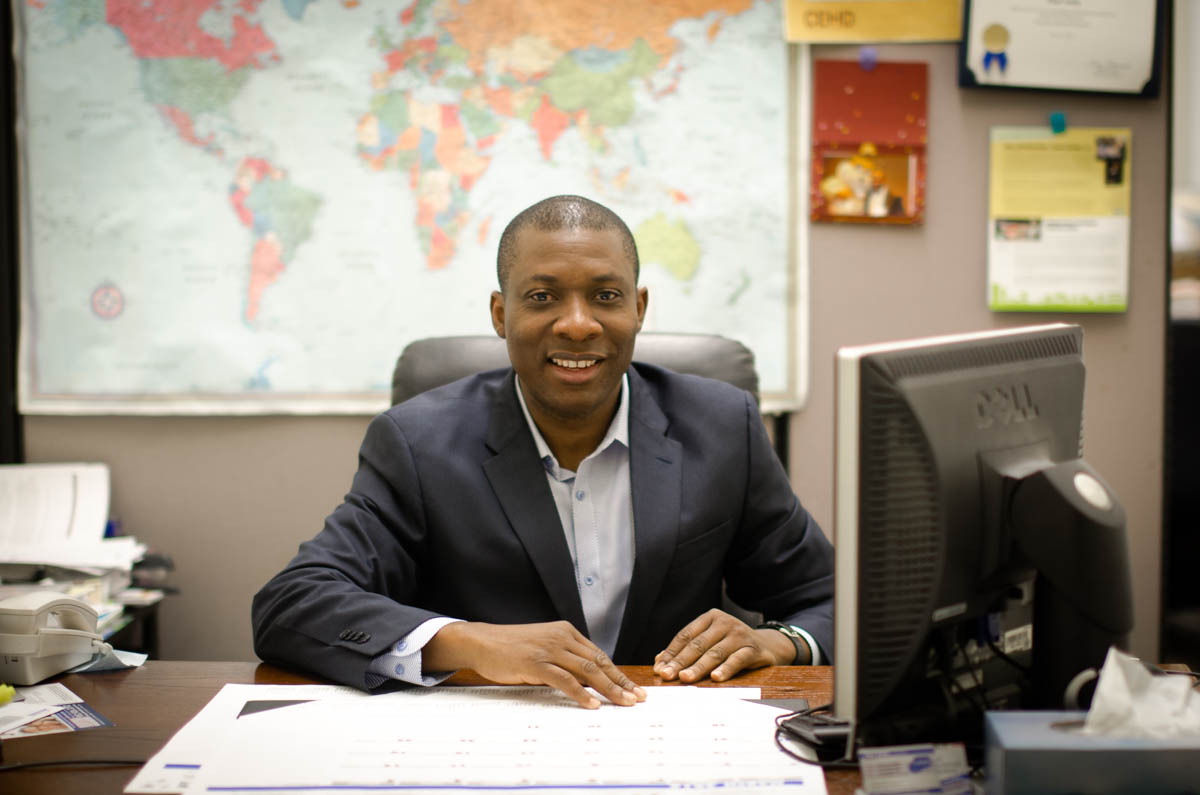Paul Amla was only 18 when he fled his native Togo. He left behind his mother and five brothers and sisters, including his twin. Among the few things he carried were the multiple languages he spoke—including Togo’s native language Ewé, the interethnic language Mina, plus French and some German.
He also carried a gift for serving others in need. In fact, he had first chosen a path in school to prepare him to become a priest.
Today Amla serves people in need by providing translators and interpreters in Minnesota and beyond. Every day, hospitals, schools, government agencies, and other organizations turn to Amla International Translations, a small business headquartered at Sabathani Community Center in south Minneapolis.
Amla draws upon a group of about 200 translators and interpreters who work as independent contractors in 150 languages. Spanish and Somali are the most commonly sought, he says, but Amla International specializes in hard-to-find languages such as Kizigua, spoken in a region bordering Somalia, Kenya, and Tanzania.
“Or Ewé—nobody ever heard of it!” Amla laughs.
Amla’s path to become a small-business entrepreneur led through the human resource development (HRD) master’s program in CEHD, where he gained skills and experiences he would need. But he didn’t start out with that in mind.
Building on education
Amla was the son of educators—his mother a teacher and his father a principal. But when Amla was only 14, his father was killed by a drunk driver who hit him as he was returning home from an evening church mass. At the time, his father had been in the process of nomination to become the next superintendent of Togo’s school system.
“My parents loved education,” says Amla. “My love for knowledge and furthering my academic goals can be attributed to them.”
In Minnesota, the young Amla found himself placed with a family for a year and a half. He credits Vincent and Marie McGraw with giving him the gift of a second family. He was also assigned to a caseworker with Catholic Charities, Bill Koness, who played an important role in helping him make a successful transition. Amla studied hard to learn English and enrolled in community college.
At Minneapolis Community and Technical College, Amla felt the need to support people who didn’t have the support he did. He began to provide translation and interpreter services when he could. Then people began to ask him for help finding translators or interpreters for languages he didn’t know.
“I become a person to ‘go get it,’” says Amla. He kept it up part-time even when he started working at a bank. “I remember a friend told me, ‘You could build a business!’”
Amla transferred to the University of Minnesota and completed a bachelor of arts in global studies with a minor in African and African American studies. Then he went on for his master’s in HRD.
“This degree helped me become a better interpreter,” says Amla. “I fell in love with it.”
The highlight of his years at the U was a trip to Paris for 10 days in 2006 with his adviser, now professor emeritus Jim Brown, and 15 others, where they visited organizations related to education. They learned about employment law in France and met with staff of the U.S. embassy and other organizations, including the president of UNICEF. Amla’s French fluency made him an important asset to the group. The experience gave him valuable new information and also a new perspective on his own experiences and skills.
He particularly remembers a presentation about the importance of saving a school year for young migrants.
“My experience as a refugee taught me that, every time there’s a war, people don’t think about education—they think about survival,” Amla explains. “But youth can better their lives through education. […] Education should be a positive experience, rewarding, and a confidence booster for children. The further out the education piece is delayed, they can easily fall victim to behavioral problems and a greater risk of failing at adapting successfully into the new system.”
Real world
Amla’s family is still large and close, though in several countries. His twin brother, who was forced to leave Togo a few years after he did, resettled in Canada with his wife and children. His sister and her family live in Belgium. Three brothers continue to live in Togo. His mother came to Minnesota, and Amla has two children of his own. His Minnesota host dad, Vincent, passed away but he remains close to Marie and her family.
He has also stayed in touch with CEHD. He was named one of its Rising Alumni in 2013 and served on the CEHD Alumni Society Board.
“My education prepared me for the real world and my career,” says Amla. “It enhanced my leadership and entrepreneurship skills.”
Learn more about Amla International, the human resource development program, and the Department of Organizational Leadership, Policy, and Development.
Story by Gayla Marty | Photo by Susan Andre | July 2016
